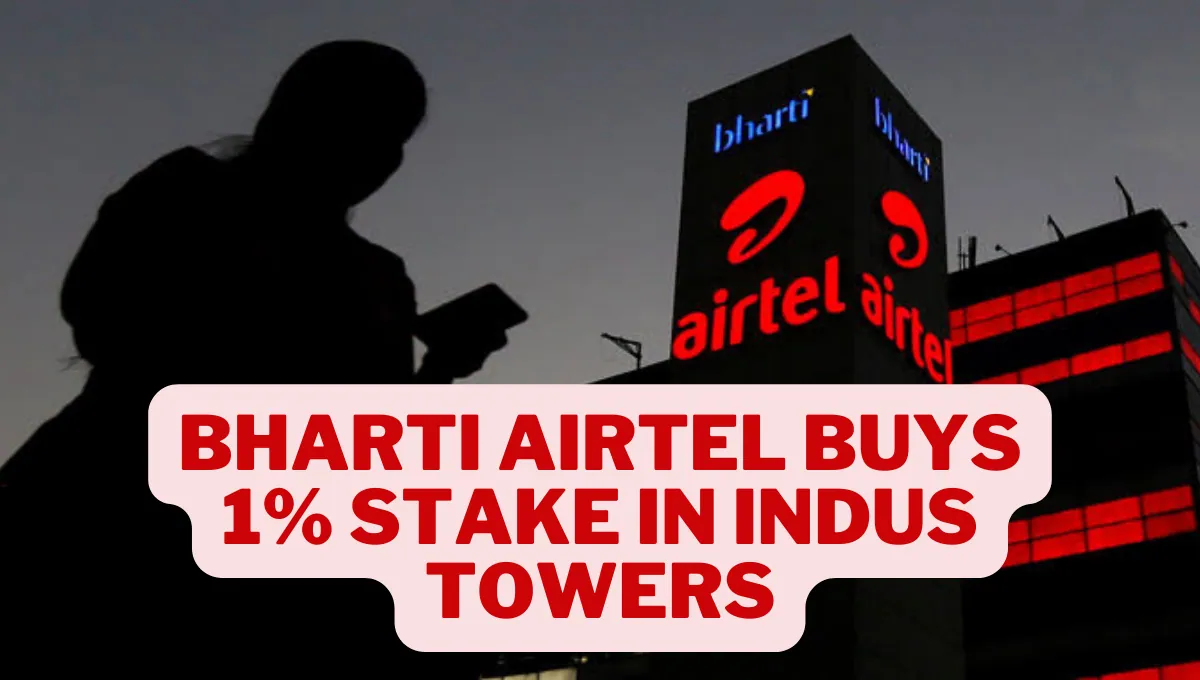In a strategic move that has captured the attention of the telecommunications sector, Bharti Airtel announced on Wednesday its acquisition of a 1% equity stake in Indus Towers.
This development follows the sale of nearly 20% shareholding in Indus Towers by the UK’s Vodafone Group.
Overview of the Acquisition
Bharti Airtel, one of India’s leading telecom service providers, revealed in a stock exchange filing that it has acquired 2.695 crore shares in Indus Towers.
This transaction was executed ‘on-market’, highlighting a straightforward purchase approach.
The acquisition was part of a broader authorization from the company’s directors to purchase up to 2.7 crore (27 million) equity shares in Indus Towers Limited.
Background and Context
Before this acquisition, Bharti Airtel held a substantial 47.95% equity stake in Indus Towers.
The additional 1% stake enhances its influence and control over the telecommunications infrastructure company.
This move comes in the wake of Vodafone Group‘s significant divestment, where it sold as many as 53.3 crore shares in Indus Towers, raising Rs 17,065 crore.
Market Reactions and Stock Performance
Bharti Airtel’s Stock Movement
On the day of the announcement, Bharti Airtel’s stock experienced a slight dip, trading down around 1.21% at Rs 1,411.
This minor decline could be attributed to various market factors, including investor reactions to the overall market environment and the specifics of the acquisition.
Indus Towers’ Market Impact
The sale by Vodafone Group and the subsequent purchase by Bharti Airtel are significant events in the Indian telecommunications market.
Vodafone Group’s decision to offload its entire $2.3 billion stake in Indus Towers through block deals has been a major talking point.
As reported, this block deal could be the second-largest in India, trailing only the ITC transaction earlier in the year.
Implications for Bharti Airtel
Strategic Importance
Acquiring an additional 1% stake in Indus Towers reinforces Bharti Airtel’s strategic positioning within the telecommunications infrastructure domain.
Indus Towers, being a critical player in the sector, provides essential support services that enable telecom operators to expand and maintain their networks.
Enhanced control over Indus Towers could translate to better operational efficiencies and competitive advantages for Bharti Airtel.
Financial and Operational Benefits
From a financial perspective, increasing its stake in Indus Towers could potentially lead to improved revenue streams and cost synergies.
Operationally, it allows Bharti Airtel to have a greater say in the management and strategic direction of Indus Towers, aligning its infrastructure capabilities more closely with its service delivery goals.
Vodafone Group’s Divestment Strategy
Rationale Behind the Sale
Vodafone Group’s decision to sell its stake in Indus Towers is part of a broader strategy to streamline its operations and possibly reduce debt.
The substantial proceeds from the sale (Rs 17,065 crore) will likely be used to strengthen Vodafone’s financial position and invest in core business areas.
Market Adjustments
According to Nuvama Institutional Equities, the scale of Vodafone’s stake sale is considerable, prompting adjustments in passive indices in the coming days.
This float adjustment is a routine market response to significant changes in shareholding structures, ensuring indices accurately reflect the market capitalization and liquidity of constituent companies.
Future Outlook for Indus Towers
Market Position and Prospects
Indus Towers remains a pivotal entity in India’s telecom infrastructure landscape.
The company has a vast network of telecom towers and related assets that are crucial for the deployment and maintenance of telecom services across the country.
With Bharti Airtel’s increased stake, the company might see a renewed focus on expansion and technological upgrades.
Investment Considerations
For investors, the developments around Indus Towers present both opportunities and risks.
On the one hand, Bharti Airtel’s increased involvement could drive operational improvements and strategic initiatives that enhance value.
On the other hand, market dynamics and competitive pressures remain pertinent factors to monitor.
Conclusion
Bharti Airtel’s acquisition of a 1% equity stake in Indus Towers marks a significant step in the company’s strategic roadmap.
This move not only strengthens its position in the telecommunications infrastructure sector but also signals confidence in Indus Towers’ future potential.
For Vodafone Group, the sale represents a strategic divestment aimed at financial consolidation and refocusing on core operations.
As the market adjusts to these changes, stakeholders will be keenly observing the impacts on share prices, operational synergies, and overall industry dynamics.
For now, Bharti Airtel’s decisive acquisition reaffirms its commitment to enhancing its infrastructure capabilities and maintaining its competitive edge in the ever-evolving telecom landscape.
